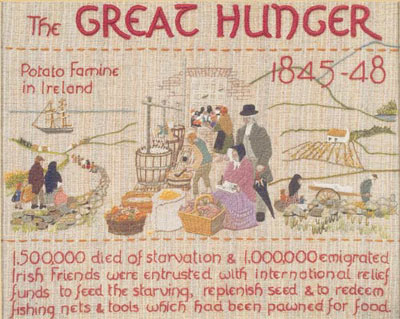“…faith without works is dead..” James 2.17
Quakers and the Rebellion of 1798
The insurrection in 1798 was particularly fierce in Co Wexford and in midland counties. There were significant numbers of Quakers in those areas. They did what they could to dissuade both sides from fighting, but are best remembered for their policy of having no guns themselves, tending the wounded of both sides equally, and not refusing food and shelter to either side, thus trying to give a good example of how to treat your fellow man.
Quakers and the Irish Potato Famine
Quakers are remembered for what they did after the potato crop in Ireland failed in 1846 for the second year running. When they realised the seriousness of the famine, straight away they formed a committee to give help. The joint secretaries were Joseph Bewley and Jonathan Pim. Funds, food and clothing were sought from Quakers in England and America.

Visits were made to the areas in most need, mainly in the west, where the potato had become virtually the only food of most of the population. Food was distributed to the needy, whatever their religion, with no strings attached. Soup kitchens were set up in towns and huge quantities were provided – you will see a small plaque in the wall of Monkstown Meeting House where it was dispensed.
In today’s money the assistance given was about €14m, much of which came from Friends in other countries, and Friends also expended a huge amount of their own time and energy. At that time there were about 3,000 Friends in Ireland out of a population of 8.5m. During and after the famine large quantities of seeds for other food crops were distributed and grants were made to fishermen to repair and replace boats and nets. Agricultural training was also provided, and a model farm was established in Co. Galway.
Having decided that he should do what he could to give people the means of avoiding famine in the future James Ellis, a Quaker businessman from Bradford, retired early in 1849 and moved to Letterfrack in Co Galway, where he and his wife Mary used their resources to provide employment and training to scores of men and give schooling to their children. Some of the buildings still exist, and when you visit Letterfrack you will still find much evidence of what they did there.
Quakers and the Traveller Community
What do you do when you realise that one section of the community is being treated unfairly by the rest? In 1965 Victor Bewley felt led to do his best to change people’s negative attitude to travellers – he did not call them itinerants or tinkers as this implied disrespect. Although he was managing director of Bewley’s cafes he devoted time and energy unstintingly to travellers’ problems for many years, becoming secretary to the Dublin Committee for Travelling People and then chairman of the National Council. He also put his faith into practice by providing sites for travellers on his small farm. His efforts had a major impact.
Quaker House Belfast
Quaker House Belfast worked for peace in the Northern Irish context over approximately 30 years before it was laid down in May 2010.
Further information about the work of Quaker House Belfast is included in the book Coming from the Silence : Quaker Peacebuilding in Northern Ireland (published by Sessions of York).


You must be logged in to post a comment.